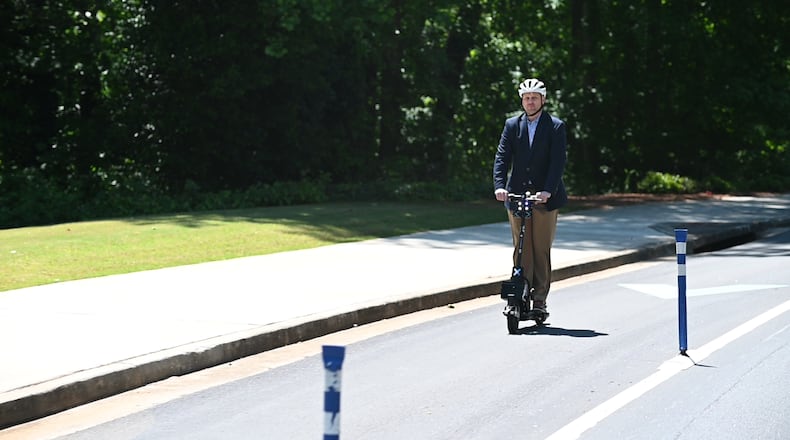Self-driving scooters are on a roll in Peachtree Corners, where residents will continue to see them cruising through Atlanta Technology Park without a driver.
The e-scooters debuted in May 2020, giving approximately 8,000 employees a new way to traverse the 500-acre technology park. The Curiosity Lab at Peachtree Corners, the Gwinnett city’s publicly funded innovation lab, worked with micromobility device company Tortoise to deploy the scooters for a six-month pilot program.
After finding success during the scooters’ test-run, Peachtree Corners City Council approved a first read-through of an ordinance at its Jan. 26 meeting that will keep them roaming through town until at least March 2022. The council will likely vote to seal the e-scooter deal during a second read-through of the ordinance at its next meeting in February.
As e-scooters started to hit Atlanta streets in significant numbers in 2018, some cities in the metro area opted to ban them or place moratoriums on their use due to safety concerns. Scooters left in the road or on busy sidewalks pose dangers to drivers and pedestrians.
But the e-scooters used in Peachtree Corners are equipped with cameras, allowing Tortoise teleoperators to control them remotely all the way from Mexico City. This ensures that the scooters are parked in a safe location and return to their charging location without the need for drivers to physically transport them at the end of the day. Once they reach the charging hub, the scooters are wiped down and disinfected by an employee.
By using teleoperators, it also allows users to summon a scooter to their location, similar to ridesharing programs. The scooters travel within a designated geographic boundary, running along the city’s 1.5-mile autonomous vehicle test track and Tech Park streets. The scooters go up to 12 mph, but they slow down to 2 mph if they leave the set boundary.
In the future, Peachtree Corners hopes to expand the boundary of the e-scooters, letting residents ride them across the city, said City Manager Brian Johnson. Before that happens, though, the city needs to make sure it’s safe for cars, pedestrians and cyclists, he said.
“We’ve got to make sure that it’s being used properly,” Johnson said. “Humans on these scooters we’re not worried about; it’s the tele-operation portion because these are people who are driving using a camera. That’s harder to do than just driving something yourself.”
Peachtree Corners was the first city to use tele-operated e-scooters, and Tortoise has since deployed them in Boise, Idaho. The scooters initially had two wheels with a kickstand, but a new version of the scooters foregoes the kickstand and adds an extra wheel in the back.
Anyone can request an e-scooter in the city’s technology park using the Go X Apollo app, but they can only be driven on streets and not on sidewalks. It costs $1 to unlock the scooter plus $0.25 per mile, or users can pay $29.99 to rent one for the entire day. Riders must be at least 16 years old and have a driver’s license.
About the Author
The Latest
Featured




